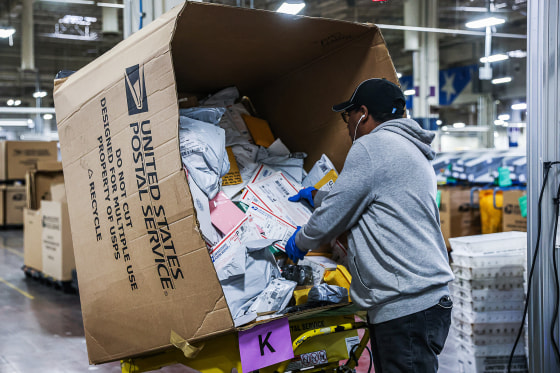
On Tuesday, the USPS announced that all incoming packages from Hong Kong and China will be temporarily suspended.
According to an advisory placed on the agency’s website, the change is effective immediately and will be in force until further notice. According to the USPS, letters and large envelopes—known as “flats”—sent from Hong Kong and China would not be affected.
More from CNBC
-
Nissan and Honda shares rise as report says automakers may call off merger talks
-
Google removes pledge to not use AI for weapons, surveillance
-
Amid tariff worries, Chipotle CEO says about 50% of the chain s avocados are sourced from Mexico
The decision follows the signing of executive orders by President Donald Trump on Saturday that imposed tariffs on Canada, Mexico, and China. Trump decided on Monday to postpone the 25% tariffs on Canada and Mexico for 30 days, but the 10% tax on Chinese imports will still be in place.
A clause in the orders closes a well-known trade loophole called de minimis, which permits exporters to send items into the United States for less than $800 duty-free.
For Chinese e-commerce companies like Shein and PDD Holdings Temu, who aim to expand their market share in the United States by providing incredibly low prices on everything from electronics and home décor to clothing and furniture, the de minimis clause has been a vital weapon.
The U.S. Customs and Border Protection Bureau reports that in 2024, the country handled over 1.3 billion de minimis shipments.According to a 2023 report by the U.S. House Select Committee on the Chinese Communist Party, Temu and Shein are probably in charge of about half of all de minimis shipments coming from China and more than 30% of all goods sent to the United States under the provision.
China Post and Hong Kong Post are postal services run by the government. It’s unclear if package shipments via private mail carriers from China and Hong Kong are subject to the restriction.A USPS representative referred CNBC to the agency’s first announcement when asked for clarification.
According to Chris Pereira, president and CEO of consultancy firm iMpact, around 31% of last-mile deliveries for cross-border e-commerce enterprises are handled by the USPS. According to him, they also use smaller carriers in addition to a range of shipping companies like DHL, FedEx, and UPS.
According to Pereira, the ban may result in higher pricing for American consumers and higher expenses for sellers, as USPS has historically been a cost-effective choice, especially for small merchants in China.
De minimis imports, according to lawmakers, provide Chinese businesses an unfair edge by avoiding duties.De minimis packages are also subject to minimum documentation and inspection, according to trade officials.
Because they claim de minimis shipments have made it possible for illegal substances, like fentanyl, to enter the country through the mail, trade associations and advocacy groups have urged Trump to stop them.
It’s uncertain if Temu, Shein, and other Chinese e-commerce sites would be able to maintain their sharp rise in the US if they are subject to tariffs.
Temu and Shein have already said that de minimis is not a key component of their business plans. Chinese retailers can now transport their items to the United States and store them in local warehouses thanks to the opening of distribution centers by Shein and Temu in the country.
Wen Biao, general manager of the logistics firm Qianhe Technology Logistics, based in Shenzhen, stated that the opening of U.S. warehouses for domestic distribution became popular last year as large e-commerce companies looked to protect themselves from additional trade restrictions.
According to a CNBC translation of Wen’s Mandarin-language comments, Biao claimed that demand for his company’s warehouse in Los Angeles was booming.
